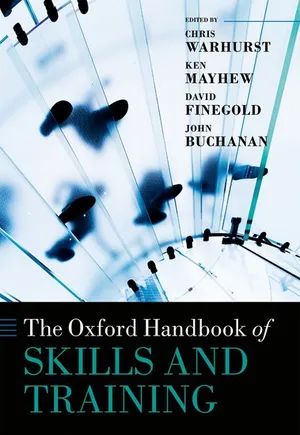IER News & blogs
Visiting professorship at INETOP/CNAM, Paris
 Professor Rachel Mulvey will be in Paris all this month, working at INETOP/CNAM - France's national institute for the study of work and career. Rachel is no stranger to CNAM, having taught in 2015 on the ECADOC summer school which brought together doctoral students from across the globe, all doing research on career. She returned last year as examiner on a PhD jury and is both honoured and delighted to be invited back, this time as visiting professor.
Professor Rachel Mulvey will be in Paris all this month, working at INETOP/CNAM - France's national institute for the study of work and career. Rachel is no stranger to CNAM, having taught in 2015 on the ECADOC summer school which brought together doctoral students from across the globe, all doing research on career. She returned last year as examiner on a PhD jury and is both honoured and delighted to be invited back, this time as visiting professor.
In addition to its research and scholarly work, the institute offers Masters programmes in both occupational and career psychology. Rachel will be running workshops on qualitative methods for these students who are now in their dissertation semester - and for doctoral candidates too. She is contributing to European research on 'decent work' led by Valérie Cohen-Scali and Jean-Luc Bernaud. This elaborates themes considered at the UNESCO conference on life design and decent work.Rachel will present findings from the two CEDEFOP studies to colleagues at the institute, showcasing the findings by the French country team (which she led) set in the context of the wider study undertaken with IER colleagues Jenny Bimrose, Alan Brown and Sally-Anne Barnes.
IER welcomes Professor Paul Edwards
 Professor Paul Edwards will be joining IER as an Honorary Professor. His research career began with the study of workplace industrial relations and industrial conflict. He has subsequently studied new management practices in the workplace and managerial careers, both in the UK and in international comparison. Current research is focusing on small firms and their employment practices, with a particular emphasis on firms run by new migrant to the UK.
Professor Paul Edwards will be joining IER as an Honorary Professor. His research career began with the study of workplace industrial relations and industrial conflict. He has subsequently studied new management practices in the workplace and managerial careers, both in the UK and in international comparison. Current research is focusing on small firms and their employment practices, with a particular emphasis on firms run by new migrant to the UK.
Developing Partnerships with Education and Industry for Work-based Learning Opportunities: An International Perspective
 Dr Deirdre Hughes has been invited to co-deliver a webinar with Yolande Burgess, Strategic Director, London Councils to the US National Collaborative on Workforce and Disability for Youth (NCWD-Youth). This Network coordinates the State Leaders Career Development Network and includes leaders from 20 states who meet monthly to discuss their career development implementation efforts, especially as they apply to the use of individual learning plans. The webinar will focus on sharing good practice in the design, implementation, and evaluation of career development.
Dr Deirdre Hughes has been invited to co-deliver a webinar with Yolande Burgess, Strategic Director, London Councils to the US National Collaborative on Workforce and Disability for Youth (NCWD-Youth). This Network coordinates the State Leaders Career Development Network and includes leaders from 20 states who meet monthly to discuss their career development implementation efforts, especially as they apply to the use of individual learning plans. The webinar will focus on sharing good practice in the design, implementation, and evaluation of career development.
Oxford Handbook of Skills and Training published
 The Oxford Handbook of Skills and Training has just been published by the Oxford University Press. Co-edited by IER Director Chris Warhurst, it features sections on: Concepts, Definitions and Measurements of Skill; Education, Training and the Development of Workforce Skills; Skills Demand and Deployment; Skill Outcomes; Differing Skill Systems; and Current Challenges to Policy. Read more.
The Oxford Handbook of Skills and Training has just been published by the Oxford University Press. Co-edited by IER Director Chris Warhurst, it features sections on: Concepts, Definitions and Measurements of Skill; Education, Training and the Development of Workforce Skills; Skills Demand and Deployment; Skill Outcomes; Differing Skill Systems; and Current Challenges to Policy. Read more.
Credentials and self-reported skill gain do not measure the same
 As a part of the LEGACY project, Dr Heike Behle recently presented a paper in which two ways to measure learning gain were critically assessed: Credentials and self-assessed improvement of specific skills.
As a part of the LEGACY project, Dr Heike Behle recently presented a paper in which two ways to measure learning gain were critically assessed: Credentials and self-assessed improvement of specific skills.
Both ways have drawbacks: Credentials can be an effective way of measuring student learning within a particular class, since most institutions have a scaled grading system already in place. It is problematic, however, to use across classes and institutions and it does not measure the ‘distance travelled’ during higher education. On the other hand, self-assessed improvement of skills will always be subjective and will differ according to individuals’ personality and their personal and HE-related circumstances such as gender and subject studied. It is also important to notice that both data is censored, i.e. improvement is not unlimited.
Using Futuretrack data, Heike compared both ways and found that those who increased their learning gain using credentials are less likely to assess their skills highly, both variable correlate negatively. The findings are currently being prepared for publication. Reported in THES.
